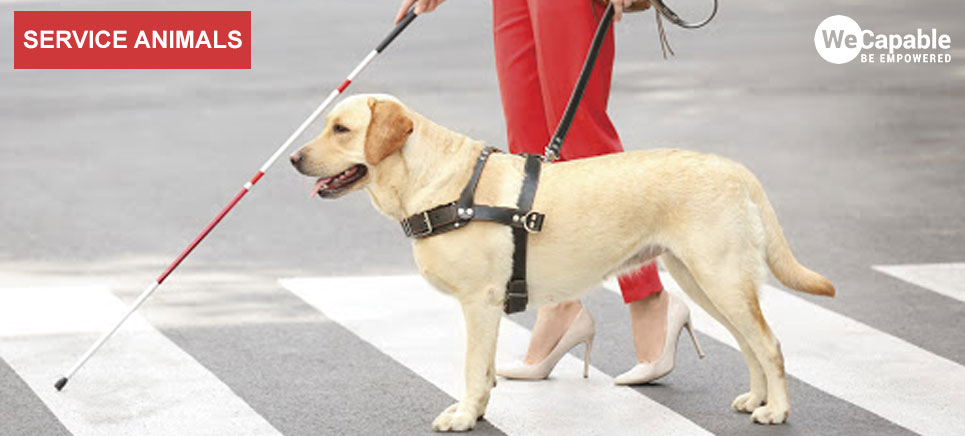You might have come across people flaunting their cute pets on different social media channels. Many of them claim themselves to be ‘parents’ to their pets and lovingly call the pets their ‘paw babies’. These cute social media posts give the impression that pets are dependent on their owners as little babies.
But, there are some very responsible paw babies too!
Yes, we are talking about service animals who take many responsibilities of their master who happen to be inflicted with a disability. These service animals help persons with disabilities to live their life to the fullest and that too with full dignity.
Let us see how different animals are helpful for persons with disabilities.
Guiding the Path
The most common form of a service animal is a guide dog/animal. They are mostly used by people with vision impairment. The guide dogs help their handler to navigate in the house and through the streets. They are also helpful in identifying potential hazards for their owner and alert them accordingly.
Alerting the Owner
Service dogs that are trained for helping persons with hearing impairment are called ‘hearing animals’. They help their owner by hearing and physically alerting them for sounds like the doorbell, alarm clock, oven buzzer, smoke alarms, telephone ring, siren etc. These dogs convey their message or guide the owner to the source of the sound by physically touching them.

Helping with Daily Chores
There are service animals who help their disabled master in their daily chores. These animals can open and shut the door, switch on and off the lights, pick objects fallen on the ground or even bring small items from the nearby grocery. Some service animals are trained to provide balance for people with mobility issues. They can even pull a wheelchair and call the emergency number if needed.
Interestingly, apart from dogs some other animals like capuchin monkeys too are trained for helping disabled people in their day-to-day life. They can perform complicated tasks like bringing a glass of water with a straw, playing a CD or turning the page of a book for their owner.
Relieving Stress
Not only dogs but a range of animals including cats, fish, birds, rabbits etc. can help people with anxiety in relieving stress. They are especially helpful for children and adults with autism. They soothe and help in improving the mental well-being of their owner.
Saving Life
Service dogs working with people with epilepsy are their lifesavers. They can raise an alarm to get external help and also assist a person when they are having a seizure. They are trained to assess the situation and work accordingly. The service dogs sometimes lie next to their owner to save them from an injury. They can even alert about the presence of allergen for which the owner may be susceptible. Some service dogs can even detect harmful rise or fall of blood sugar levels in their owner and alert them for timely action.
These are some of the most common ways a service animal lends a helping paw to its disabled owner without judging them. The service animals can be trained for the specific needs of their owner.
Use the citation below to add this article to your bibliography
"Service Animals: Helping Paws for People with Disabilities." Wecapable.com. Web. June 15, 2025. <https://wecapable.com/service-animals-guide-dogs-people-with-disabilities/>
Wecapable.com, "Service Animals: Helping Paws for People with Disabilities." Accessed June 15, 2025. https://wecapable.com/service-animals-guide-dogs-people-with-disabilities/
"Service Animals: Helping Paws for People with Disabilities." (n.d.). Wecapable.com. Retrieved June 15, 2025 from https://wecapable.com/service-animals-guide-dogs-people-with-disabilities/

Leave a Reply